This book by Sinclair Lewis has been recommended online a lot lately (since it 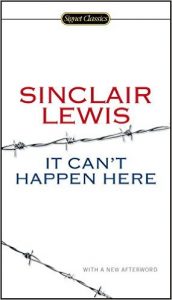 has to do with the idea of a sort of populist fascist coming to power in America). I’m a bit torn on it.
has to do with the idea of a sort of populist fascist coming to power in America). I’m a bit torn on it.
On the one hand, there’s some cleverness in the portrayal of the leader’s rise. And, given that the book is from 1935, in some sense it predicts the nature of fascism as it rose, at least in other countries.
On the other hand, it’s about as subtle as an Ayn Rand novel. Generally speaking, the characters are simplistic and predictable, and (it seemed to me) there was very little cleverness in explaining exactly how the fascist leader character was able to dismantle all the other centers of power and bureaucracy in Washington.

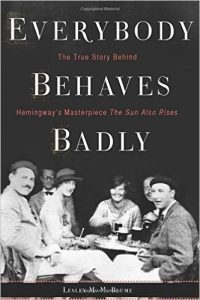 a slice of Hemingway’s early life, right up until that book made him famous (and a tiny bit afterward). My only gripe is it participates in this notion about Hemingway that I’m not quite ready to sign up for – that he was some sort of master of image creation. I’m sure he put forward an image of himself, but that’s true of every writer. It’s not obvious to me that he does it more than just about anyone else, and I don’t see him as especially calculating about it. I mean, he did put forward an image, but he also really actually liked drinking hard and watching bullfights.
a slice of Hemingway’s early life, right up until that book made him famous (and a tiny bit afterward). My only gripe is it participates in this notion about Hemingway that I’m not quite ready to sign up for – that he was some sort of master of image creation. I’m sure he put forward an image of himself, but that’s true of every writer. It’s not obvious to me that he does it more than just about anyone else, and I don’t see him as especially calculating about it. I mean, he did put forward an image, but he also really actually liked drinking hard and watching bullfights.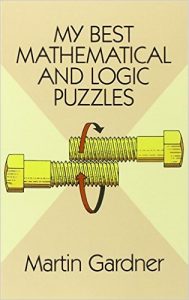 only complaint (and, it’s a bullshit complaint) is that I really prefer a particular type of puzzle – the kind that is simple enough to easily hold in one’s head, and which doesn’t benefit from having pencil and paper. Some of the puzzles had interesting results, but really just required you to sit and write out a little algebra.
only complaint (and, it’s a bullshit complaint) is that I really prefer a particular type of puzzle – the kind that is simple enough to easily hold in one’s head, and which doesn’t benefit from having pencil and paper. Some of the puzzles had interesting results, but really just required you to sit and write out a little algebra.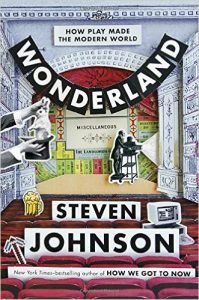 pleasure very important to the history of science, technology, and culture. As an example, Johnson argues that interest in automata helped lead (if a little indirectly) to the development of computers. Apparently, Babbage was quite interested in these early robots as a child, and it probably influenced his work. Johnson discusses other topics, such as the spice trade and the development of the Jacquard loom.
pleasure very important to the history of science, technology, and culture. As an example, Johnson argues that interest in automata helped lead (if a little indirectly) to the development of computers. Apparently, Babbage was quite interested in these early robots as a child, and it probably influenced his work. Johnson discusses other topics, such as the spice trade and the development of the Jacquard loom.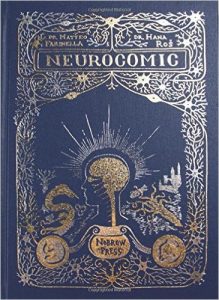 neuroscience and history of brain studies. It’s an interesting idea, but it didn’t really work for me. The artwork is very rudimentary, and the concepts are fairly straightforward. It didn’t feel to me like the ideas especially benefited from a comic format. The book did have an interesting sort of dreamy feel, in which a man goes through a sort of Alice in Wonderland style world of the mind, but ultimately I didn’t feel the concept paid off so much as provided occasional enigmatic bookends to sections.
neuroscience and history of brain studies. It’s an interesting idea, but it didn’t really work for me. The artwork is very rudimentary, and the concepts are fairly straightforward. It didn’t feel to me like the ideas especially benefited from a comic format. The book did have an interesting sort of dreamy feel, in which a man goes through a sort of Alice in Wonderland style world of the mind, but ultimately I didn’t feel the concept paid off so much as provided occasional enigmatic bookends to sections. the war, Höss wrote out a memoir, a few short documents, and some letters. They are collected in this book, which through its strangeness becomes a sort of lesson in evil. It is remarkable how utterly banal much of his descriptions of Auschwitz are. Much of his writing dwells on what are basically HR problems, having to do with lazy employees or employees who did a good job but created a bad work environment.
the war, Höss wrote out a memoir, a few short documents, and some letters. They are collected in this book, which through its strangeness becomes a sort of lesson in evil. It is remarkable how utterly banal much of his descriptions of Auschwitz are. Much of his writing dwells on what are basically HR problems, having to do with lazy employees or employees who did a good job but created a bad work environment.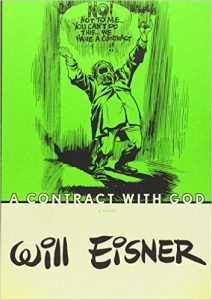 considered the first serious graphic novel. Given that pedigree, it’s interesting to point out that the book is in fact somewhat transitional between books and comics, containing large sections of (hand-drawn) text, with somewhat simple drawings. I didn’t find the stories themselves particularly amazing (sorry if that’s utterly without class to say!) but they aren’t bad, and they are well drawn. And, as a window into the history of comics, it’s quite good. Incidentally, if you are interested in the history of Jewish New York, there’s a lot here for you as well.
considered the first serious graphic novel. Given that pedigree, it’s interesting to point out that the book is in fact somewhat transitional between books and comics, containing large sections of (hand-drawn) text, with somewhat simple drawings. I didn’t find the stories themselves particularly amazing (sorry if that’s utterly without class to say!) but they aren’t bad, and they are well drawn. And, as a window into the history of comics, it’s quite good. Incidentally, if you are interested in the history of Jewish New York, there’s a lot here for you as well.